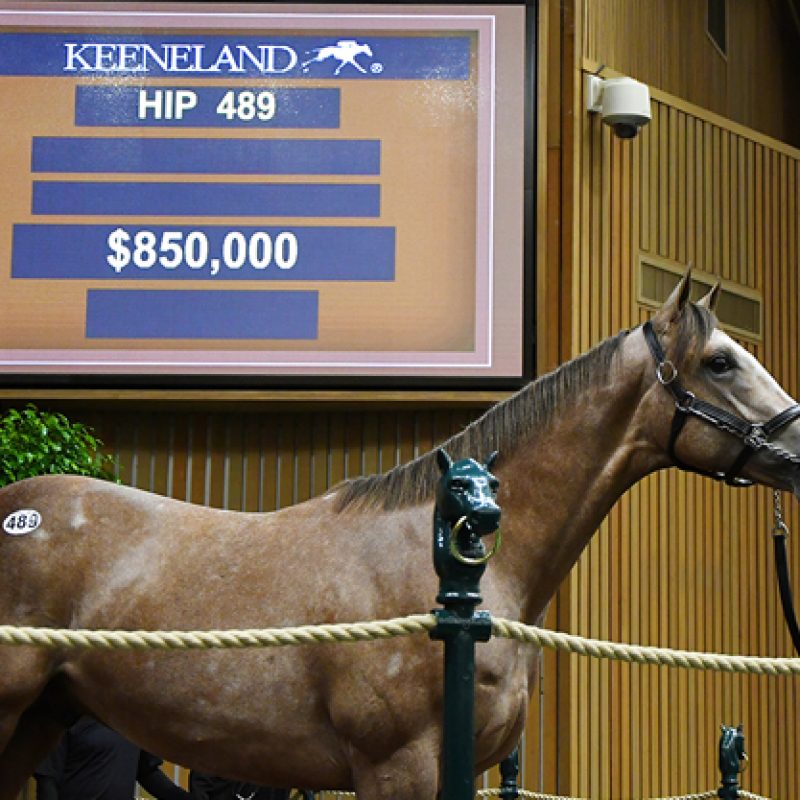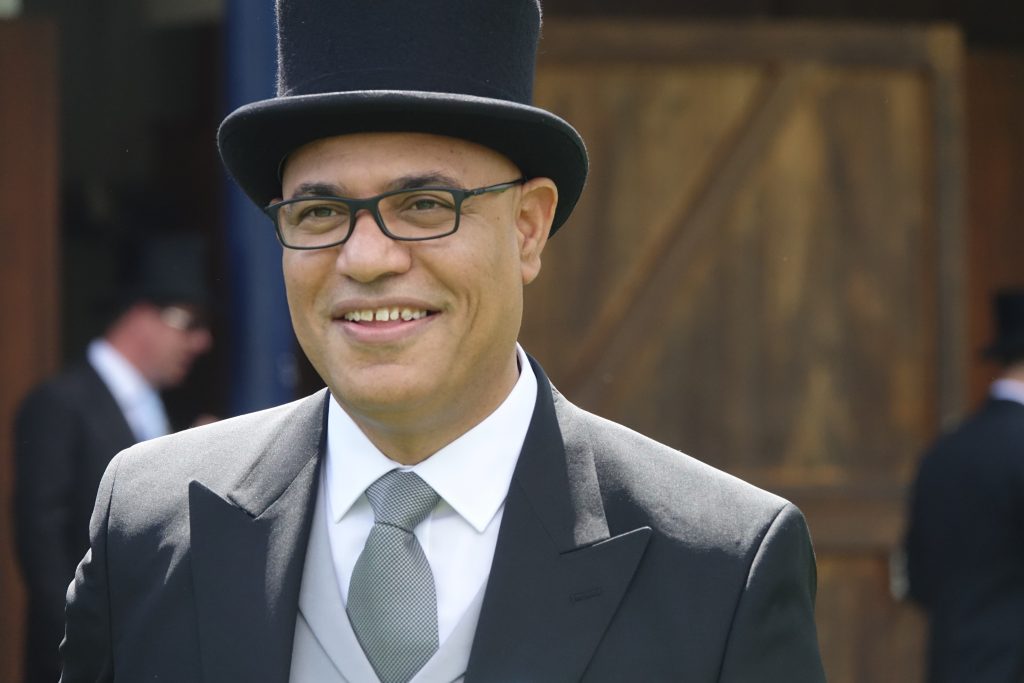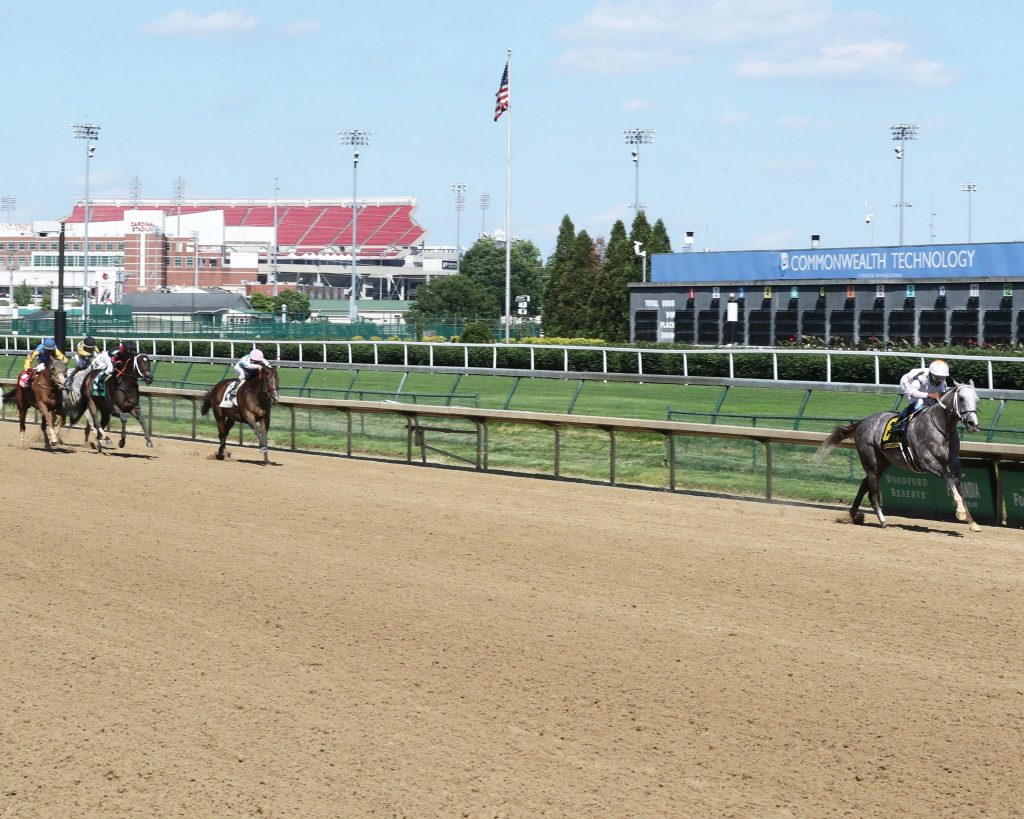
Partnerships are the here and now way of thoroughbred ownership. Years ago, the top horses were primarily owned by the stables who bred and raced them and generally were not for sale. The sport has evolved in so many ways and partnerships have changed the game allowing more people than ever to experience the thrill of owning a racehorse, even at the levels once reserved for the few and elite. They have become so prevalent; we can safely call them the new normal. All partnerships are not created equal. At the end of the day this sport is about winning. To win you need the right people in the right places. More importantly, you need fast horses.

“We have massive ambition, we do not deny that; we want to compete with the very best at the very top, both in terms of racing and breeding”.
That’s a bold statement. It comes from Amer Abdulaziz Salman, the CEO and man behind Phoenix Thoroughbreds. I agree with it, if you are going to get in the game, you want to play and win at the highest levels. Amer is making that happen at Phoenix.
By just about any standard, Phoenix Thoroughbreds has already achieved its goal. The partnership won its first Grade 1 with Dream Tree. They campaign world class Gronkowski who was competitive in races like the Belmont Stakes and Dubai World Cup. You don’t get more World Class than that. They won at the prestigious Royal Ascot meet with both Signora Cabello and Advertise while they also campaign the high-quality stakes filly Lady Apple.
Having only been around since 2017, Phoenix Thoroughbreds has built up an impressive resume. In addition to all this they may very well be campaigning the fastest horse to come around in a long time in Volatile. Being in the family of Lady Tak, a quick winner of the Grade 1 Test at Saratoga, Volatile figured to be fast, but just how fast is he?
Volatile pushed himself to the top of the sprint division winning the Aristides Stakes at Churchill Downs. It was how he did it that screamed Breeders’ Cup Sprint. He stopped the clock in 1:07.57 geared down in front by about 8 lengths. He is young, lightly raced, and may still actually be on the improve. He is also not all flat out all the way. He can shut off so to speak and still maintain a high speed or pace before he kicks in.
With an exciting prospect like Volatile in the barn, we thought we’d catch up with Amer and learn more about him, and Phoenix Thoroughbreds.
Amer, when and where did you first develop a passion for horse racing?
I’ve been around horses all my life. My family owned a farm breeding purebred Arabians. My interest grew out of that, and I was lucky enough to have some success as an Arabian owner. It wasn’t until I went to college in the USA though that my passion for thoroughbred racing really took off.
What was the first racetrack you visited?
It was while I was studying at Berkley that I first went to Golden Gate Fields. As I mentioned, I was already hooked on horses and to see these thoroughbreds up close was amazing. It soon became a regular trip.
Why did you decide to form Phoenix Thoroughbreds?
I wanted to combine my passions for racing and business and to show you can make a profit from the sport by bringing together all the areas of the industry under one banner. It’s not just about success for us on the track but also in the breeding barn and at the sales.
You have had success with older horses you purchased in training, like Gronkowski, and also younger horses pre-race, which do you prefer and why?
Gronkowski was bought as an unraced prospect from the breeze-up sales in Newmarket, but you’re right we have had success with the likes of Advertise and Signora Cabello who were purchased after they began their careers. This is an excellent way of minimizing the risk as you will clearly know more about their ability.
That said I think you can potentially get more value buying yearlings and unraced two-year-olds at the sales. We have an excellent bloodstock team and hopefully, we have some nice prospects in the pipeline.
It’s also worth mentioning we are now in a position to race more of our homebreds, which is very exciting. We’ve already had some Group One success as breeders and that was a huge thrill.
Which of your current prospects excite you the most?
That’s an excellent question. We have lots of potentially lovely types in the USA, either un-raced or just at the start of their careers. Both Volatile and Scolding are very impressive. If the old adage that the clock doesn’t lie is true, then they both could be extremely useful. Scolding regressed last out but we look for her to come back strong. Volatile couldn’t have been better in his last start.
Would this also be the one you have the highest expectations for?
Both Volatile and Scolding would be high on the list, but we also have big hopes for America’s Surprise. She’s by American Pharoah and a half-sister to Songbird. Jerry Hollendorfer’s recent reports on her have been very positive and she’s set some very quick times in her recent workouts. She’s run a couple of really promising races and it looks as though she’s starting to develop nicely. Hopefully, she can have a significant impact on the track before making a lovely broodmare.
What would you consider the biggest success of Phoenix Thoroughbreds thus far?
We’ve been lucky enough to have had a lot of success since we started, but if I had to pick one, it would be Farnan’s victory in the Group One Golden Slipper in Australia. To win the World’s most valuable two-year-old race was always going to be special, but given he’s homebred, it meant a great deal more. The victory was the result of years of hard work getting Phoenix Thoroughbreds set up and our breeding operation in place. It represented much of what we set out to achieve and showed us we are on the right track. Eventually, we aim to be up there with Coolmore and Juddmonte as recognized breeders and owners of champions.
What race is the one you most want to win and why?
The Kentucky Derby would be right up there but having gone so close with Gronkowski in 2019, I’d have to say the Dubai World Cup. We were pretty sure he’d have gone close again this year, but COVID-19 put pay to that! Dubai is also home now, so to win such a prestigious race in our back yard would be something to cherish.
What race do you think is the most difficult to win worldwide and why?
I think every top-level race is very tough to win, but the Kentucky Derby seems just about the most challenging. First, you have to find a horse good enough and then hope he can qualify. The element of having to gather enough points to get in makes it especially tough as it means your contender has to stay in top form for a few months. We were victims of that with Gronkowski who qualified through the European Road to the Roses only to miss the big race after a slight setback.
Then of course if you do make it in, you are taking on some of the best and most in-form horses from across the USA and beyond!
What are your thoughts on racing in the US as opposed to other parts of the World?
It’s unique. The way it’s organized, the way meets are scheduled is different from almost anywhere else in the World. For the most part, the prize money is excellent and in a typical year, there is plenty of opportunities for all of our runners.
Also, we’ve seen that with the right horse you can make an impact beyond just racing. The American public loves their sport and embrace stories like California Chrome, American Pharoah and Justify like nowhere else in the World, perhaps besides Australia. I think that’s a huge asset and makes racing in the USA hugely attractive.
What do you look for in a horse you are considering that others may not value as highly?
I think the only thing we might do differently from some is to evaluate any potential purchase with a long-term view beyond their racing career. It perhaps has given us more leeway in the past to bid with more confidence on well-bred fillies. In particular, knowing that while we want to raise their value with high-profile wins on the track, it’s not the end of the world if they don’t as they will still make nice breeding prospects.
If you could have owned any horse from any time or anywhere in history who would it have been?
Cigar comes to mind. I was at Nad Al Sheba to see him win the first Dubai World Cup and it set the tone for the future of the race. He would have fitted in the Phoenix model well, traveling all over chasing the big prizes. Moreover, he was just a fantastic racehorse that bought a lot of joy to a lot of people.
How do you select your trainers?
We have built up some great relationships with our roster of trainers, so we know which horses suit each style of training. We often work alongside our trainers when going to the sales and if we buy any horses they recommend we send those to them. We would also look at a horse’s pedigree and consider a new trainer if they have done well with the family in the past.
Do you get involved in where your horses will run, and the selection of rider?
Not really. Our trainers are the people who know our horses best, so we trust them to make the best decisions. We might, very occasionally, suggest a possible international target, such as the Saudi Cup, but in the main we let our trainers get on with things. As mentioned, our trainers know us and our goals well and we all pull in the same direction.
Likewise with riders, while we would have a few preferred choices, we are happy for our trainers to match the best jockeys for each horse.
You have had success on a high level thus far for the partnership and have come up with excellent prospects, what do you attribute that to?
Hard work and a dedicated team. With as many horses as we have in as many countries as we do, we have some very committed people working for and with us making sure everything runs smoothly and with success. We often joke that ‘Phoenix Thoroughbreds never sleeps’ and quite often that’s true. There was plenty of work done years before we sent out our first runner, making sure that when we were ready, we could hit the ground running.
We also work alongside very talented trainers who constantly get the best out of our runners while we also have worked with and continue to work with some of the best in the bloodstock industry trying to unearth the next star.
It’s very much a team effort.
What makes Phoenix Thoroughbreds different from other partnerships?
As we’ve touched upon earlier, we have taken all the areas of the industry and put them under one umbrella. What you see on the track is just a small part of our operation. We are regular sellers at sales and have had some success pinhooking too. It’s the side of Phoenix a lot of people don’t see.
I think our scope also sets us apart from most other partnerships with horses based in the US, Europe, Australia, Dubai and South America.
We have almost limitless ambition and are always looking to the future and exploring new ways in which we can move forward.
Tell me more about Volatile. How did you find him? What attracted you to him? Any thoughts on where he runs next and do you think he may possibly stretch out?

We bought him at the Keeneland September sale in 2017 and we liked everything about him. Violence is a Stallion we like very much and have had some success with while the rest of his page looked attractive. Seeing the likes of Lady Tak in the pedigree gave us plenty of confidence. He also cut a very impressive figure on the sales grounds and I think the whole team was keen to get hold of him. When we found out Three Chimneys was also interested it seemed like the logical thing to do was to partner with them rather than bid each other up.
I spoke to Steve (Asmussen) earlier this week and we will head to the Vanderbilt at Saratoga next. That’s when we’ll find out whether he is as good as we hope, and think, he is. He’s been so impressive but we’re excited to see him tested at the top level.
Personally, at the moment I think sprinting is his game but after this season, if we can keep him healthy and in top form, we’ll certainly discuss all options with Steve and our partners.
You said a lot of work was done before you launched Phoenix, how many years was this in your plan and how long did it take you to put it all together?
The idea for Phoenix has been with me for a while but is was a good two to three years of hard work getting everything in place. We wanted to make sure the idea was sound from a business point of view and study which markets we wanted to concentrate on. It was a case of making sure the infrastructure was sound so we could give ourselves the best chance of early success.
I have to agree, Phoenix Thoroughbreds never sleeps seems to fit. It is not easy to launch a partnership in 2017, and in 2020 be players at the highest levels, worldwide, in a sport as competitive as horse racing. With young horses like Scolding and Volatile I felt like I should have brought Amer sunglasses as the future looks bright. I didn’t need to. He already had some.
Being a student of the game and having the passion for it like I do, I could not have enjoyed Amer and his equal passion for it more.




